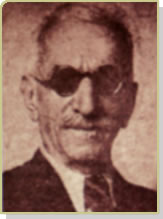
COMPOSITEURS ET INTERPRÈTES
LEVON HANCIYAN
(1857-1947)
Armenian composer. Hancıyan was born in Hasköy, Istanbul. His father was Nazaret, the concierge of Sünbüllü Han in Çakmakçılar, who played lauta. His mother was Eftil, who also learned from Markar. He and his family moved to Üsküdar when he was young. There is some doubt about the dates of his birth and death. Hancıyan is known as singer. He began his musical training at a young age, studying with Zekâi Dede, Mutafzâde and Yağlıkçızâde. Some sources mention that he also studied with Dellâlzâde and İsmail Dede. According to his own statement, he took part in the Turkish-Russian war of 1877-78. After his discharge from the army, he went to Bulgaria, Romania and Egypt, where he taught music to talented individuals and children of the Palace. He also studied the musics of the west and the Far East. During the reign of Abdülhamit II, he was forced to flee to Bulgaria, where he taught Turkish music in the conservatory of Sofia.
He worked in Dârülelhân and when he died, he was buried in Bakırköy Armenian cemetery. It is said that he composed many works, but only a few works (below) are still known. Many of Hancıyan’s works were notated by Hamparsum and this notation collection was sold to Ankara Radio after his death, then some of them were passed into the hands of Refik Fersan. Later they were sold to Istanbul Radio, and then back to Fersan. Many people, like R. Fersan, Kapriyal Ebeyan, L.Karabey, Nigâr Gaalib Ulusoy, L. Atlı, Z. A. Ataergin, S.Z.Özbekkan, were influenced by Hancıyan. He had many students from Dârülelhân and Dârüttâlîm.
These are among his works: 1.Sûznâk Peşrevi, 2. Hüseynî, 3. Sûz-I Dil, 4. Şehnâz Bûselik Saz Semâîleri, 5. Hizâzkâr Aksak Semâî (Nihân etdim senî ey meh pare, cânımsın), 6. Hicâz Aksak (her ne rütbê iftihâr etsem de şimdî var yeri, 7. Hicâz Müsemmen (Seyr eden bû kalb-I meftûnûnu çiftê benlidir), 8. Sûznâk Curcuna (Şem’a-î dildâra yakdın gönlümû sad âh ile), 9. Sûznâk (Bir gün geleceksin diye …), 10. Ferahfezâ Türk Aksağı (Bugün ey meh senin îlê gidelim), 11. Hicâzkâr Orta Aksak (Güzelsin şâh-I hûbansın, niçün böylê perîşansın?), 12. Dilkeş-Hâverân (Hiç sorma sakın hâl-I dil-î zârı, karşımam), 13. Karcığar Aksak (Çokdan beri ey bulbul-I gülzâr-I zarâfet, müseddes), 14. Kürdî’li Hicâzkâr Aksak (hayâtım, şîve-kârım, dil-pesendim), 15. Nihâvend Semâî (Bilmeden esrârını, düşdüm âteş-î aşka), 16. Rast Aksak (Sorma pek âyâ ne oldum), 17. Sûz-i Dil Curcuna (Cânâ gam-ı aşkınla perîşan gezer oldum), 18.Uzzâl Ağır Aksak (Ey felek, yıkdın dil-î âbâdımı), 19. Tâhir-Bûselik Devr-i Kebîr Beste (Zahmdâr-î hayretim, dâğımla yârem bağlarım), 20. Istanbul Efendisi Opereti (Musâhib-zâde Celâl).

